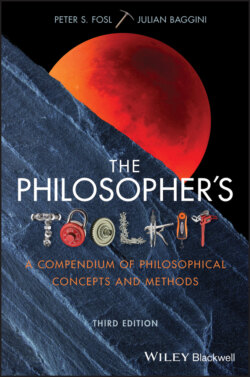Читать книгу The Philosopher's Toolkit - Julian Baggini, Julian Baggini - Страница 36
Defining validity
ОглавлениеValidity is a property of well‐formed deductive arguments, which, to recap, are defined as arguments where the conclusion in some sense (actually, hypothetically, etc.) follows from the premises necessarily (see 1.2). Calling a deductive argument ‘valid’ affirms that the conclusion actually does follow from the premises in that way. Arguments that are presented as or taken to be successful deductive arguments, but where the conclusion does not in fact definitely follow from the premises, are called ‘invalid’ deductive arguments.
The tricky thing, in any case, is that an argument may possess the property of validity even if its premises or its conclusion are not in fact true. Validity, as it turns out, is essentially a property of an argument’s structure or form; and so, the content and truth value of the statements composing the argument are irrelevant. Let’s unpack this.
Consider structure first. The argument featuring cats and cheese given above is an instance of a more general argumentative structure, of the form:
1 All Xs are Ys.
2 Z is an X.
3 Therefore, Z is a Y.
In our example, ‘block of cheese’ is substituted for X, ‘things that are more intelligent than all philosophy students’ for Y, and ‘Meg’ for Z. That makes our example just one particular instance of the more general argumentative form expressed with the variables X, Y, and Z.
What you should notice is that you don’t need to attach any particular meaning to the variables for this particular form to be a valid one. No matter with what we replace the variables, it will always be the case that if the premises are true (even though in fact they might not be), the conclusion must also be true. If there’s any conceivable way possible for the premises of an argument to be true but its conclusion simultaneously be false, any coherent way at all, then it’s an invalid argument.
This boils down to the notion of validity as content‐blind or topic‐neutral. It really doesn’t matter what the content of the propositions in the argument is – validity is determined by the argument having a solid, deductive structure. Our block‐of‐cheese example is then a valid argument, because if its ridiculous premises were true, the ridiculous conclusion would also have to be true. The fact that the premises are ridiculous is neither here nor there when it comes to assessing the argument’s validity.
